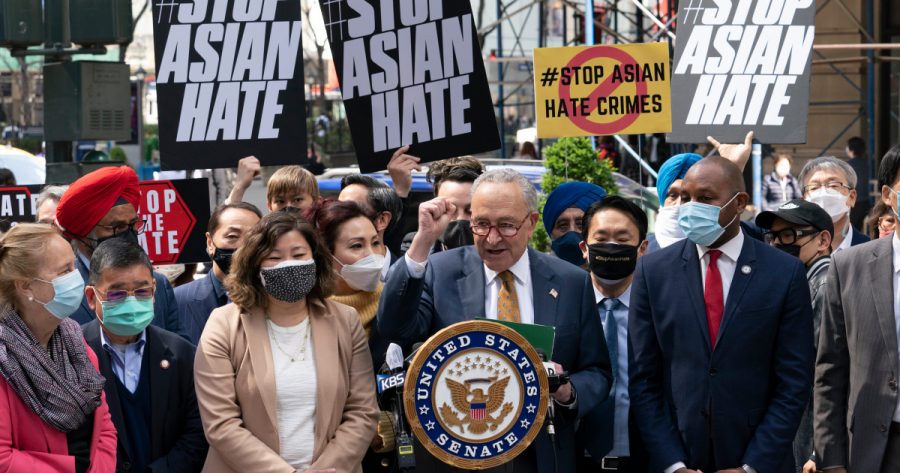U.S. passes Anti-Asian Hate Crime Bill amidst rise in hate crimes
Senate Majority Leader Chuck Schumer, D-N.Y., center, is joined by U.S. Rep. Grace Meng, D-N.Y., third from left, at a news conference to discuss an Asian-American hate crime bill, Monday, April 19, 2021, in New York. Schumer is pushing for passage of the COVID-19 Hate Crimes Act in the Senate. (AP Photo/Mark Lennihan)
On Thursday, May 20, Joe Biden signed the Anti-Asian Hate Crime Bill, also known as the Covid Hate Crime bill. Here’s what you need to know about it and how it will affect us and Asians living in America.
Ever since the COVID pandemic started, the disease was heavily–and arguably unfairly– associated with Asians. Considering the fact that Covid-19 started in China, many took that as an opportunity to express their hatred for and microaggressions towards asians. Even former President Donald Trump would regularly use racist phrases such as “kung flu” to describe the coronavirus, further increasing anti-Asian sentiment in the country.
As this escalated, people even began to get comfortable with inflicting violence on Asians in America. Asian hate crimes have been scarily on the rise since. Stopaapihate.org documented 6,603 hate incidents from March 2020 to March 2021, and experts say there are most definitely even more that have gone undocumented and unreported. This, and the March shooting which killed 8 people (six of which were Asian women) at different asian owned spas, has led Biden and other leaders to pass this bill.
The legislation was introduced by Representative Grace Meng, Democrat-N.Y., and Senator Mazie Hirono, Democrat-Hawaii. The purpose of the bill is to reduce anti-asian hate crimes and it aims to do so by making the reporting of hate crimes more accessible at the local and state levels by boosting public outreach and ensuring reporting resources are available online.
The bill also ordered the Department of Justice to designate a person to speed up the review of hate crimes related to COVID-19 and it authorizes money grants to state and local governments to conduct crime-reduction programs to prevent and respond to hate crimes.
The bill’s journey began with the senate. When the bill was introduced to the Senate on , it resulted in a surprising, almost unanimous vote in favor of it (only 1 Senator voted against the bill, Republican Josh Hawley). Despite people being afraid of republicans not being in support of the bill, the bill ended up satisfying many Senate Republicans. Collins, republican senator, said the bill’s provisions would improve data collection on hate crimes, many of which she said go unreported.
Senator Mazie Hirono, one of the people who created the bill and the senate’s lead bill sponsor happily comments that passing the bill sent a “solid message of solidarity that the Senate will not be a bystander as anti-Asian violence surges in our country,”. The bill was also passed by the house in a bipartisan 364-62 vote on May 18. The bill passed both of it’s hurdles, sending it to President Joe Biden’s desk.
As a result of the overwhelming support from both chambers of Congress, President Biden signed legislation Thursday that addressed hate crimes throughout the COVID-19 pandemic, with particular emphasis on the increase in violence against Asian Americans.
This bill will essentially give Americans, especially those of Asian descent, easier access to reporting resources so that less and less hate crimes go unreported. It also would task the department with coordinating with local law enforcement groups and community-based organizations to facilitate and raise awareness about hate crime reporting, including establishing an online hate crime reporting system in multiple languages. As a student, when these community-based organizations begin to pop up, you could volunteer at one of them.
“Every time we’re silent, every time we let hate flourish, we make a lie of who we are as a nation,” President Biden said before signing the bill.
Your donation will support the student journalists of Parkdale High School. Your contribution will allow us to cover our annual website hosting costs and publish some printed editions, as well.
Christiana is a sophomore at Parkdale High School. This is her first year on staff at The Paw Print. She contributes general news articles and entertainment...










